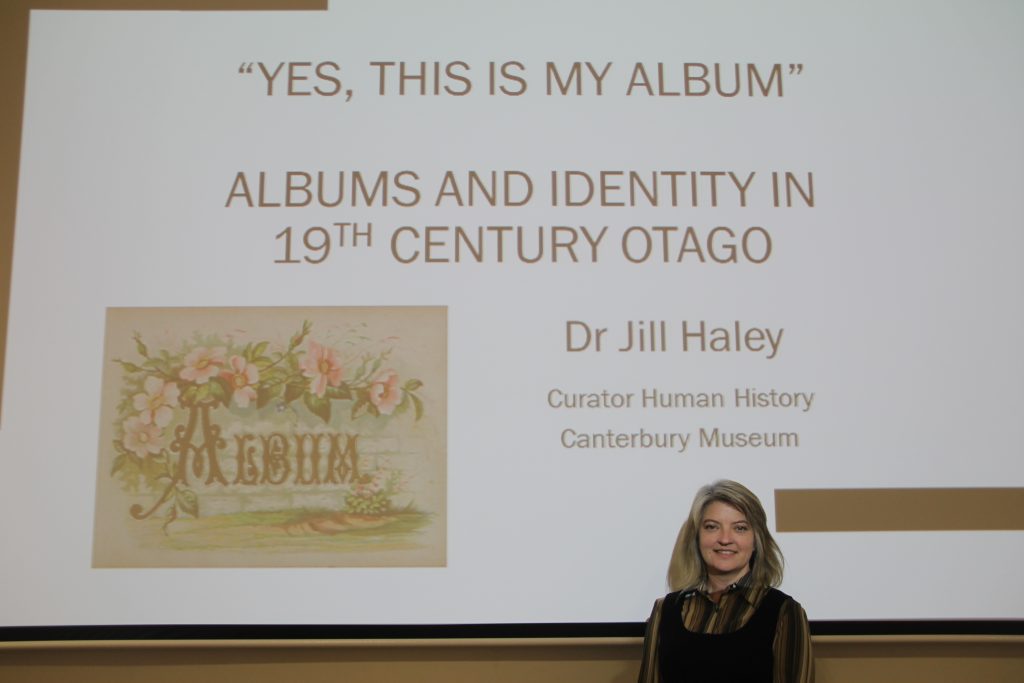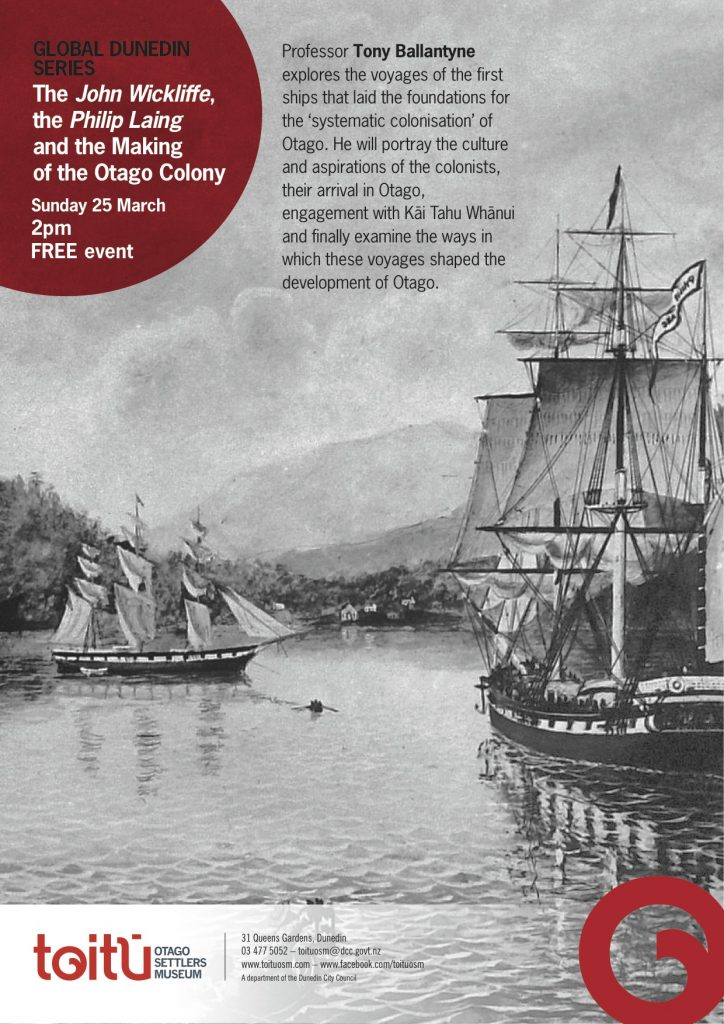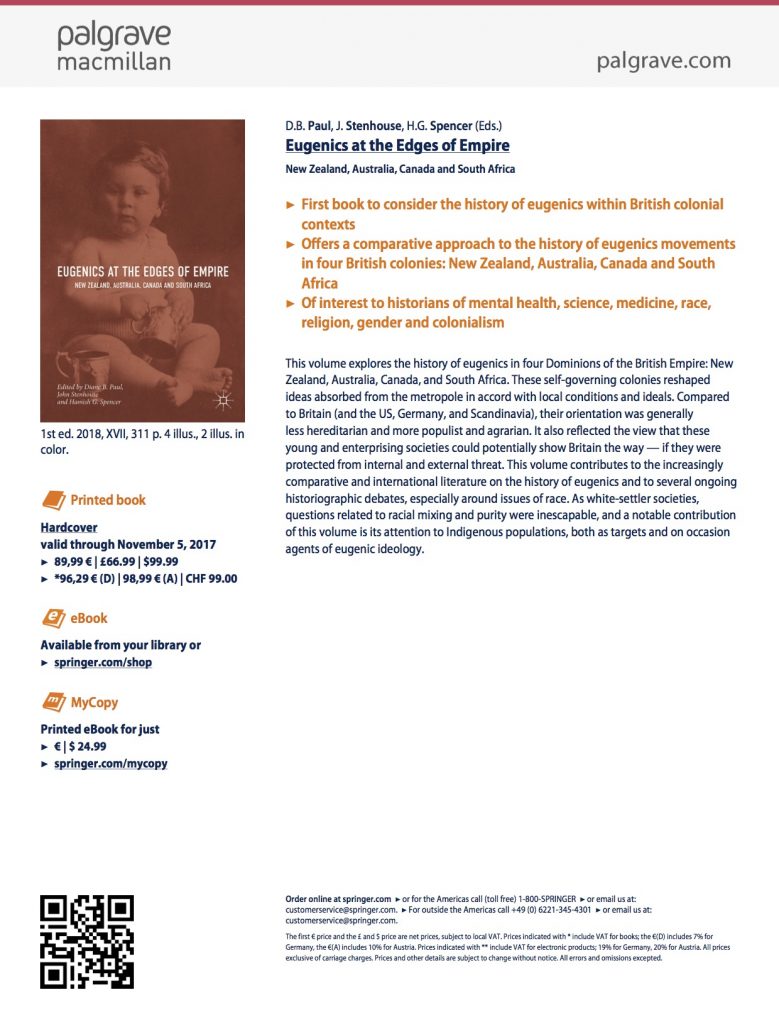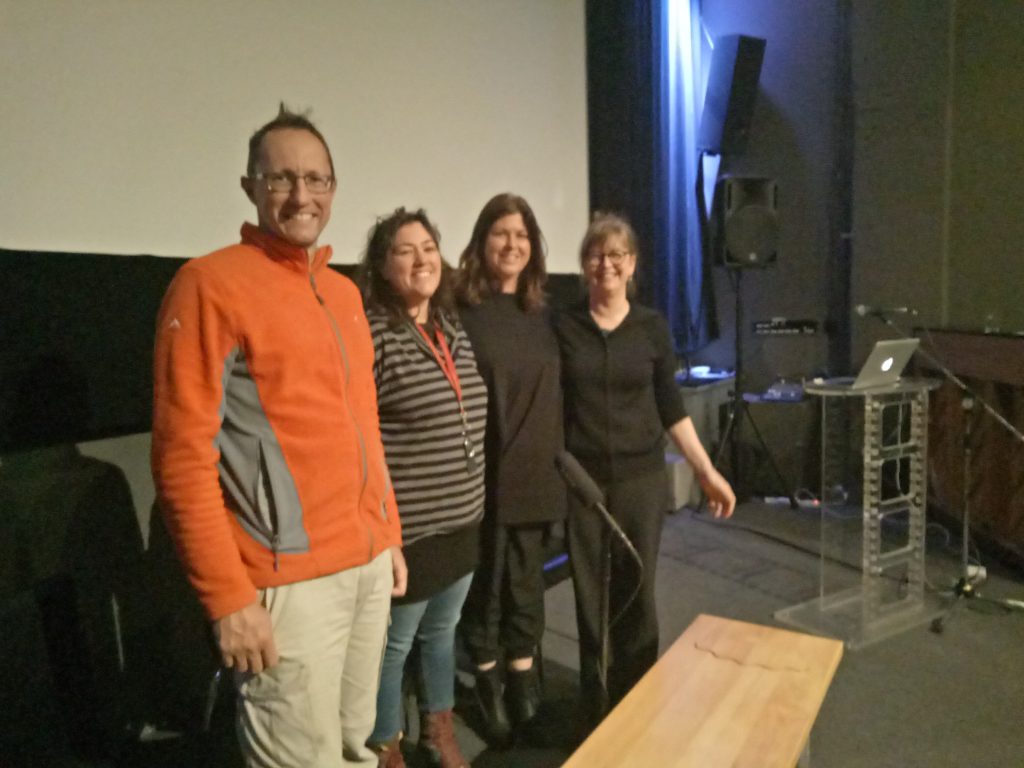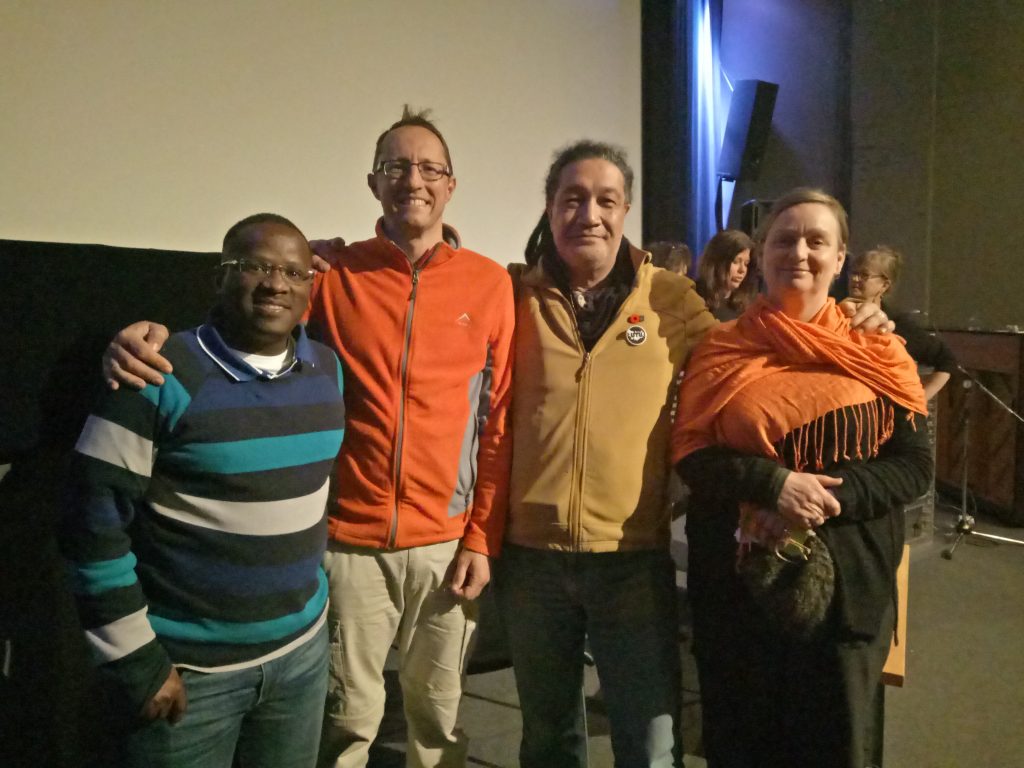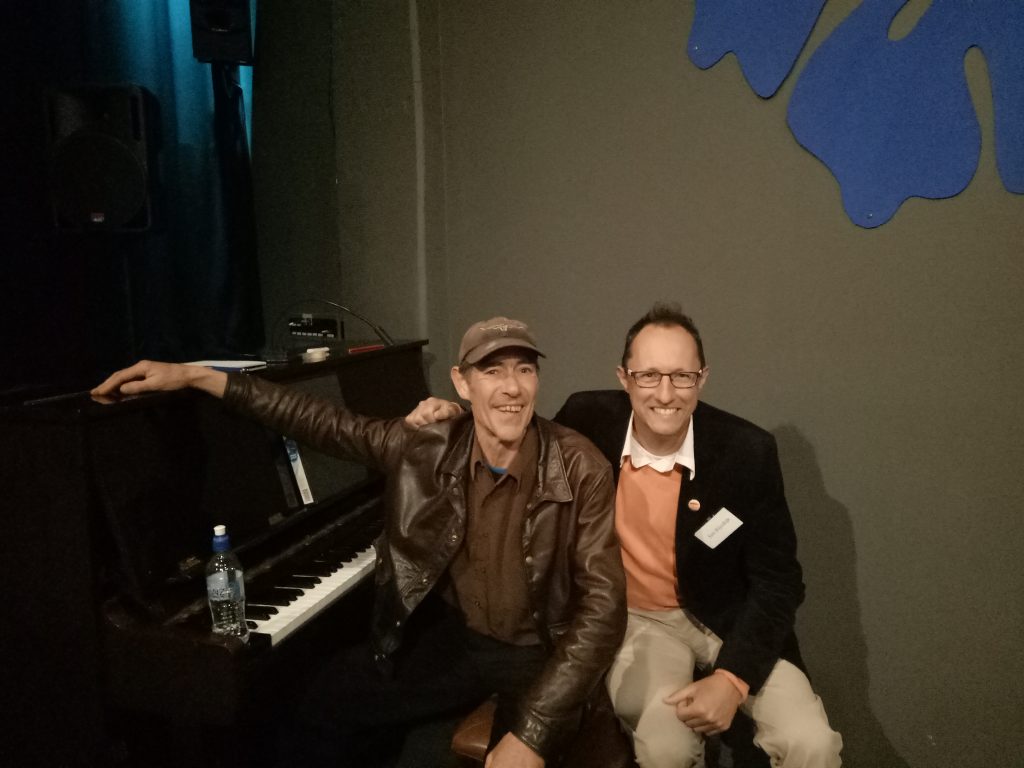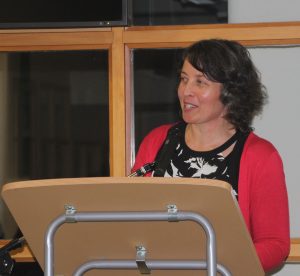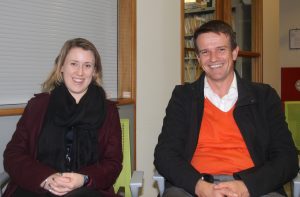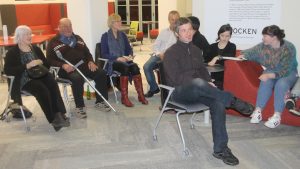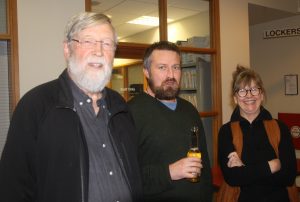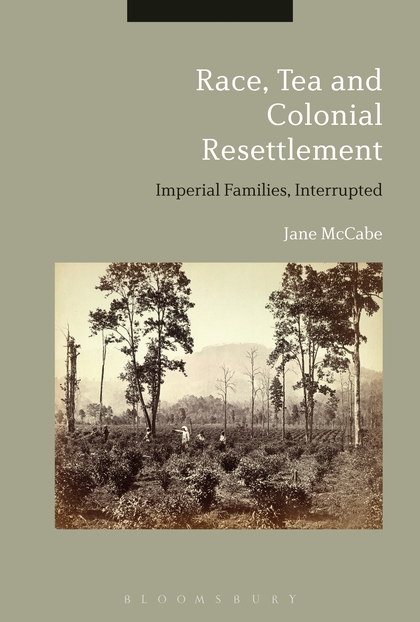Photography, Family Albums and the Making of Identity
In conjunction with Toitū Otago Settlers Museum, the Centre hosted the third lecture in the Global Dunedin Speaker Series on Sunday 13 May. Dr. Jill Haley, Curator Human History at Canterbury Museum, and a former archivist at Toitū, spoke to an attentive audience about album culture in colonial Otago and how engagement in this practice helped forge personal identity. In a richly illustrated talk, Jill discussed some the findings from her recent doctorate titled The Colonial Family Album: photography and identity in Otago, 1848-1890 (which can be downloaded from the University of Otago’s library here), which examined over 50 albums from Toitū’s collection. Although it might be assumed that albums were used by migrants to remember family and to assert familial connections to their former homes (whether Scotland, England or Ireland), instead the majority of album makers collected and displayed photographs that asserted their connections to their new home in the Otago colony. But album makers also included photographs that illuminated the global dimensions of their personal connections, including Priscilla Scott’s, which included images relating to places she visited with family, notably Peru, Hawaii and the United States. Increasingly, album makers also purchased photographs of local and international celebrities, as well as the the British Royal Family, for their collection.
Many thanks to Jill for a fantastic and illuminating talk that provided an insight into how the global practices of photography and album culture were shaped by local conditions and utilised to narrate personal identity.
Visiting Scholar: Prof. Pamela Klassen
With Religious Studies the Centre is co-hosting a visiting scholar, Pamela Klassen, Professor in the Department for the Study of Religion at the University of Toronto, where she is also Vice-Dean, Undergraduate & International in the Faculty of Arts & Science. The author of many books and articles, her most recent publications are The Story of Radio Mind: A Missionary’s Journey on Indigenous Land (U of Chicago Press, 2018) and Ekklesia: Three Inquiries in Church and State (U of Chicago Press, 2018), co-authored with Paul Christopher Johnson and Winnifred Fallers Sullivan. She currently holds the Anneliese Maier Research Award from the Humboldt Foundation in support of a five-year collaborative project entitled “Religion and Public Memory in Multicultural Societies,” undertaken together with Prof. Dr. Monique Scheer of the University of Tübingen. For more information, see http://projects.chass.utoronto.ca/pklassen/
While in Dunedin Prof. Klassen will give several public talks. The first is a research seminar in the Department of History and Art History, Wednesday 11 April, 3.30pm, in Burns 5, ground floor Arts Building (95 Albany Street) on the topic “Photography, Resistance, and Re-mediation on Manidoo Ziibi”.
In this presentation, Prof. Klassen will consider the significance for studies of missionary colonialism of what scholars call the “photographic event,” focusing on a diary written by an Anglican missionary-journalist, Frederick Du Vernet, during his 1898 trip to visit the Ojibwe of Rainy River in Treaty 3 territory (also known in Canada as northwestern Ontario). Du Vernet recorded both Ojibwe resistance to and requests for his picture-taking. His stories reveal how the event of taking photographs marked his own longing to capture spiritual stories and presences and provoked a variety of Ojibwe responses to such forms of visual capture. The talk will also introduce a new visual/textual/audio remediation of the diary in the form of a digital storytelling website being developed with a team of students in consultation with the Kay-Nah-Chi-Wah-Nung Historical Centre of the Rainy River First Nations.
Two further public talks are planned:
“Frequencies for Listening: Telling Stories of Missionary Colonialism in the Wake of Canada’s Truth and Reconciliation Commission on Indian Residential Schools”, Public Lecture co-sponsored by the Centre for Research on Colonial Culture, 18 April.
“Treaty people and the spiritual vulnerability of colonial settlement”, a research presentation hosted by the Department of Theology and Religion, 20 April.
Further details about these events will be advertised in the near future.
Centre News and Forthcoming Events
The Centre has had a busy start to 2018. We opened the year with an international symposium, co-convened by Judy Bennett (Otago) and Paul D’Arcy (ANU) on ‘Colonial Environmental Transformations and responses in the Pacific World: Crops, Disease, Pests, and catastrophe’, held at the Hocken in mid-February. Across two days we were privileged to hear from scholars working at the cutting-edge of Pacific environmental history. Papers touched on long-distance animal migrations, agricultural transformations, the politics of phosphate mining in French Oceania, climate change, genetic modification, and the impacts of major health events on indigenous communities, notably the influenza pandemic in Guam. Many thanks to the organisers for putting together such an exciting programme and to the presenters for sharing their work: Vicki Luker, Tamatoa Bambridge, Ryan Tucker Jones, Jane Samson, Matt K. Matsuda, Nicholas Hoare, and Anne Perez Hattori. We look forward to seeing the papers emerge in published form in the near future.
In February and early March the Centre had the pleasure of hosting a visiting scholar, Associate Professor Aaron Glass from Bard Graduate Center, New York. While in Dunedin Aaron presented on his digital humanities project as part of a well-attended open seminar with Associate Professor Conal McCarthy (Victoria University of Wellington) concerned with digital collections, museums and indigenous futures. Aaron also presented a workshop at Otago Museum on public anthropology and visited Te Papa Tongarewa where he also shared his research. Many thanks to the team at Te Papa, particularly Bronwyn Labrum, for making Aaron’s visit possible.
A number of events planned for the remainder of 2018 including an international workshop on new histories of whaling in the Pacific (at the University of Hawai’i-Manoa) in late June, and symposia on rural history and indigenous writing in November.
Throughout 2018 the Centre is sponsoring the Global Dunedin public lectures at Toitū Otago Settlers Museum. This is a monthly series of free talks running from March to October and we have a great line-up of speakers including Charlotte Macdonald (Victoria University of Wellington), Jill Haley (Canterbury Museum) and Kate Bagnall (University of Wollongong) along with many others. The series kicks off on 25 March with a talk by Centre co-director, Professor Tony Ballantyne (see poster). All are welcome!
Eugenics at the Edges of Empire
That’s the title of a book that has just been published by co-editors Diane Paul, Hamish Spencer and CRoCC member John Stenhouse. The collection emerged out of a two-day symposium organised by the editorial team at St Margaret’s College in early 2015 and sponsored by the Centre for Research on Colonial Culture. It features contributions from several Centre members (John Stenhouse, Barbara Brookes and Angela Wanhalla), in addition to chapters on New Zealand from a number of other scholars and researchers (Charlotte Macdonald, Caroline Daley, Diane Paul, Hamish Spencer and Emma Gattey). Essays on Australia (Stephen Garton and Ross L. Jones), Canada (Erika Dyck and Alex Deighton) and South Africa (Susanne Klausen), also feature, marking this as the first collection to focus on eugenics as it developed and was applied in the British Dominions. Many congratulations to the editors and all the contributors on the publication of this important collection.
Charlotte Macdonald RSNZ
The Centre joins with the New Zealand Historical Association in warmly congratulating Professor Charlotte Macdonald (Victoria University of Wellington) on her recent appointment as a Fellow of the Royal Society of New Zealand. Charlotte has been a great supporter of New Zealand history generally, and is noted for her sharp intellect, her groundbreaking contributions to New Zealand and colonial history, as well as her intellectual generosity. We are certain there are many of us in the history community who have benefited enormously from Charlotte’s advice, guidance and mentorship over the years. Congratulations from all of us here in Dunedin, Charlotte!
Mapping Workshop
Centre member Jane McCabe has had a busy year. In May her first book was published, and officially launched the following month. It’s been well-received and getting some great media attention including a spread in the Dominion Post, as well as on the New Books Network. Jane also started a new project in February.
Rural history is at the heart of her Marsden Fast Start project entitled ‘Splitting up the Farm? A Cross-Cultural History of Land and Inheritance in Aotearoa’. In late June she hosted a mapping workshop based around that project, which was supported by the Centre for Research on Colonial Culture. The one-day workshop brought together experts in rural history, land titles and mapping to discuss best practice in use of maps and land titles in order to help Jane as she works towards the production of effective visual outputs for the project. Jane began the day with a presentation in which she set out the research questions and aims for her investigation of familial land transfer in two districts (Taieri and Hokianga) from 1870 to 1970. This helped set the framework for the workshop and focus discussion on the advantages and disadvantages of land titles for a project about cross-histones of land use and inheritance. In order to foreground the land, and attitudes to it, Jane proposed a survey of land titles/ownership to show change over time, with the aim of collating data for communication on a digital platform.
Participants discussed the value of maps in helping think about the past spatially. One inspiring suggestion was that project participants might be encouraged to draw maps of their farms so that familial and individual approaches to land use could be illuminated, thereby providing a multiplicity of voices to land use that does not rely on official maps and land titles. Personal mapping might also enable social and cultural data to be mapped that might look different to official data, detailing how families members who might not be named as owners in fact worked and used the land. Later sessions discussed land titles and their value as historical sources for mapping land ownership over time and cross-culturally.
The Centre thanks Jane for hosting this event and all the participants for sharing their expertise: Malcolm McKinnon, Michael Roche, Jonathan West, Brian Coutts, Vivienne Cuff, Michael Stevens, Hugh Campbell, Tom Brooking, Michael Stevens and Angela Wanhalla, as well as Karen Craw for kindly showcasing the Hocken’s map holdings relating to the Taieri.
The Centre has been busy hosting a number of workshops this year, and have many more on the horizon. There’s a whaling history symposium in late June 2018 in Honolulu, for instance, along with plans for an event on Māori writing in November 2018, as well as a possible workshop on rural history in late 2018. Watch this space for further details.
Film in the Colony
The Film in the Colony Symposium, held at Ngā Taonga Sound and Vision, Wellington, 13-14 July, produced some great discussions and a fine array of films in the face of some wild Wellington weather. The symposium focused on the convergence of film, film-making, the emergence of nation and interactions between peoples in colonial contexts, with an emphasis on New Zealand, South Africa and Australia. The symposium opened with two screenings on Wednesday night: Edward Curtis’s In the Land of the Headhunters (1914; Aaron Glass who was involved in the restoration of this film provided us with a commentary in the form of a recorded powerpoint), and Charles Chauvel’s Jedda (1955), introduced by Tasha James from the Australian National Film and Sound Archive.
The opening keynote speaker on Thursday, Ian-Malcolm Rijsdijk, began with a fabulous map, charting the world as it was filmed in Southern California, and, pointing out where ‘beginning with the question of how film ‘takes place’ in particular locations, moved to a wide-ranging discussion of cinema and decolonisation in South Africa, particularly in the light of the unrest currently dominating South African campuses. How do we make the archive of colonial film valuable to students trying to move away from colonial thinking? How to make it meaningful, and to find a language for discussing it? His point that colonialism is a structure, not an event, was one many found compelling.
From here the focus switched to New Zealand’s early cinema, with Minette Hillyer’s rich account of the visit of ‘Paramount’s Red Indians’ to Rotorua in 1927, and Mark Derby’s discussion of Gaston Melies’ film-making enterprise in the South Seas in 1912, which set us up well for a documentary on Melies’ tour of the Pacific and South East Asia. Alex Porter charted a journey in the other direction, with Len Lye’s departure from New Zealand to London via Samoa, a trip which resulted in his remarkable Tusalava of 1929 – which we then had the privilege of viewing.
Three papers with very different takes on Rudall Hayward’s silent The Te Kooti Trail of 1927 followed: Jani K Wilson compared two of the film’s Ngāti Awa audiences, the second including members of her own hapū; Brendan Sheridan discussed kūpapa in New Zealand Wars films; and Annabel Cooper investigated some of the film’s imagined and real communities. These papers were followed by a screening of the film brilliantly accompanied by pianist Nikau Palm – a treat followed by dinner at Siem Reap.
Friday began with a panel discussion which brought together Honiana Love (Te Ātiawa) and Lawrence Wharerau (Ngāpuhi) from Ngā Taonga with Natalie Robertson (Ngāti Porou), who combined discussion of the evolving relationships between whānau, films and archives, with commentaries on a sequence of films. Natalie, whose whānau appear in the film, talked us through James McDonald’s Scenes of Maori Life on the East Coast, enriching the film with her information about who the people are and where, the significance of their filmed work, and the signs that they were performing their customary labour for the camera, rather than simply going about daily activities. As we watched the Ahipara Women’s Fire Brigade rally to community defence, and fertiliser spreading on Te Puea’s Farm, Honiana and Lawrence discussed the archival detective work of finding out about films and the relationships developing between the archive and communities.
The session on sound brought together Mel Cross’s illustration of how Alfred Hill’s score affords a specific Maoriland resonance to Hayward’s Rewi’s Last Stand (1940); Allison Craven and Ben Palmer’s investigation of the voices of Aboriginal people in Charles Chauvel’s Uncivilised (1936); and – in a return to Rotorua – Aleisha Ward’s account of the contentious production of the first jazz film made in New Zealand, (a publicity film for Epi Shalfoon and the Melody Boys).
Megan Tamati-Quennell gave us an introduction to Lisa Reihana’s Native Portraits N.19897, which had screened through the symposium, and was followed by Felicity Barnes’s elegant revival of a neglected genre, the trade film in Australia and New Zealand. Offered a sample (Captured Sunshine), we wondered with 21st-century amazement at their bygone popularity.
Litheko Modisane closed with an analysis of the career of South African actor Ken Gampu, whose career spanned the apartheid and post-apartheid eras. Gathering up some of the larger themes of the symposium, Litheko asked how audiences could now view Gampu’s earlier work – how can a decolonising society appreciate the colonial legacy, and what vocabulary is there for analysing it. Litheko’s analysis of the complexities of Gampu’s role in Dingaka (1964) was followed by a closing panel and then screenings of Dingaka and Rewi’s Last Stand.
CRoCC would like to extend warm thanks to those who helped organise the symposium: Diane Pivac, Honiana Love and Lawrence Wharerau (Ngā Taonga), Minette Hillyer and Jo Smith (Victoria University of Wellington), Sue Lang, Helen O’Sullivan and Bronwyn Craig (University of Otago).
Annabel Cooper
Jane McCabe’s new book on Indian migrants
Last Thursday saw the successful launch of Jane McCabe’s new book, Race, Tea and Colonial Resettlement: Imperial Families, Interrupted at the Hocken Collections. Launched by Centre Co-director, Angela Wanhalla, this monograph (published by Bloomsbury) explores the experiences of the “Kalimpong Kids”, mixed-race children of tea planters in India, from their missionary-run boarding school, to their migration to New Zealand. Jane is descended of one of the children, and a number of other descendants came to the launch.
Jane, who works in the Department of History and Art History is a keen member of the Centre for Research on Colonial Culture. A Marsden Grant recipient, she is now researching land and inheritance in Aotearoa New Zealand.
Forthcoming Conferences: Law, History, Film
A number of associations have released CfPs in the past month, including the New Zealand Historical Association, the Australian and New Zealand Law and History Society (ANZLHS), plus the Law and Society Association of Australia and New Zealand (LSAANZ).
From 28 November to 1 December, the Biennial New Zealand Historical Association Conference will be held at the University of Auckland on the theme: Tāmaki Herenga Waka: Where Histories Meet, celebrating Auckland as a meeting place of people, of culture and of ideas from throughout New Zealand and across the world. The Call for Papers and details about the keynote speakers can be found on the conference website. Do note that the submission deadline for abstracts is 28 July.
The University of Otago’s Legal Issues Centre is co-hosting LSAANZ this year in association with Te Pokapū Take Ture and Ngā Pae o te Māramatanga. The Call for Papers closes on 14 July and the conference will take place from 6-9 December in Dunedin.
A few days later the ANZLHS Conference will take place at the University of Canterbury, Christchurch on 14-16 December. The conference theme is: “Legal and social change – gradual evolution or punctuated equilibrium?” This conference theme draws on evolutionary theory about how species form, and asks whether changes in the law and in the effects of particular laws on society occur through a gradual process of incremental change or through periods of relative stasis with intervening major shifts.
Inquiries or submissions of papers should be accompanied by a brief abstract and biography and sent to the programme co-ordinator, Professor Jeremy Finn jeremy.finn@canterbury.ac.nz by 21 August. Keynote speakers for the conference include Professors Charlotte McDonald (Victoria University of Wellington); Kjell Modeer (Lund University), and Amanda Nettelbeck (University of Adelaide) and Dr Te Maire Tau (Ngāi Tahu Research Centre, University of Canterbury).
CRoCC is also running a symposium on colonial film in association with Ngā Taonga, Wellington, from 13-14 July.
Centre Refunded
It is great news that the University of Otago has refunded the Centre for Research on Colonial Culture for a further five years, one of just twelve “flagship research centres”.
As Deputy Vice-Chancellor (Research and Enterprise) Professor Richard Blaikie noted, the University’s funding and other support of its flagship research centres and research themes is an important way of ensuring the internationally outstanding work of its researchers, across a wide range disciplines, is encouraged and nurtured. “We recognise that our researchers in these centres and themes are often world-leading in many areas and we are pleased to be able to back them to pursue excellence in their fields.”
The Centre now has two co-directors, Professor Tony Ballantyne and Associate Professor Angela Wanhalla. A number of events are planned over the coming years, about which information will be forthcoming soon.

